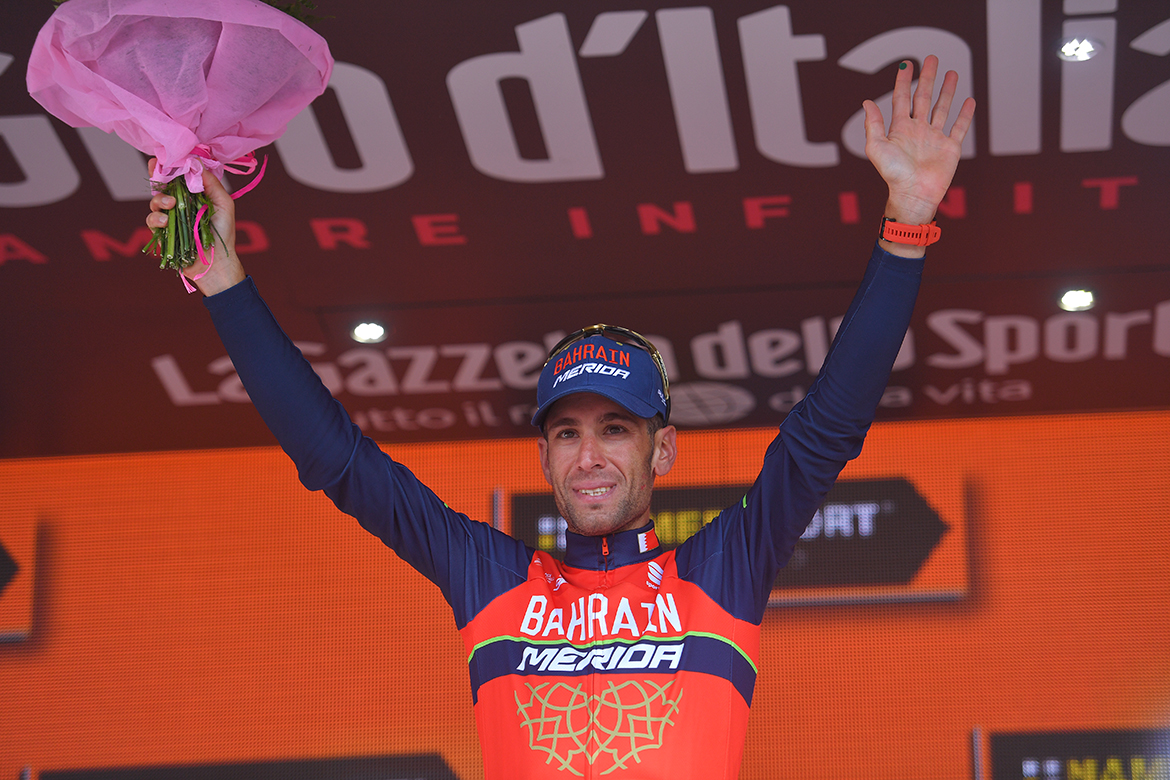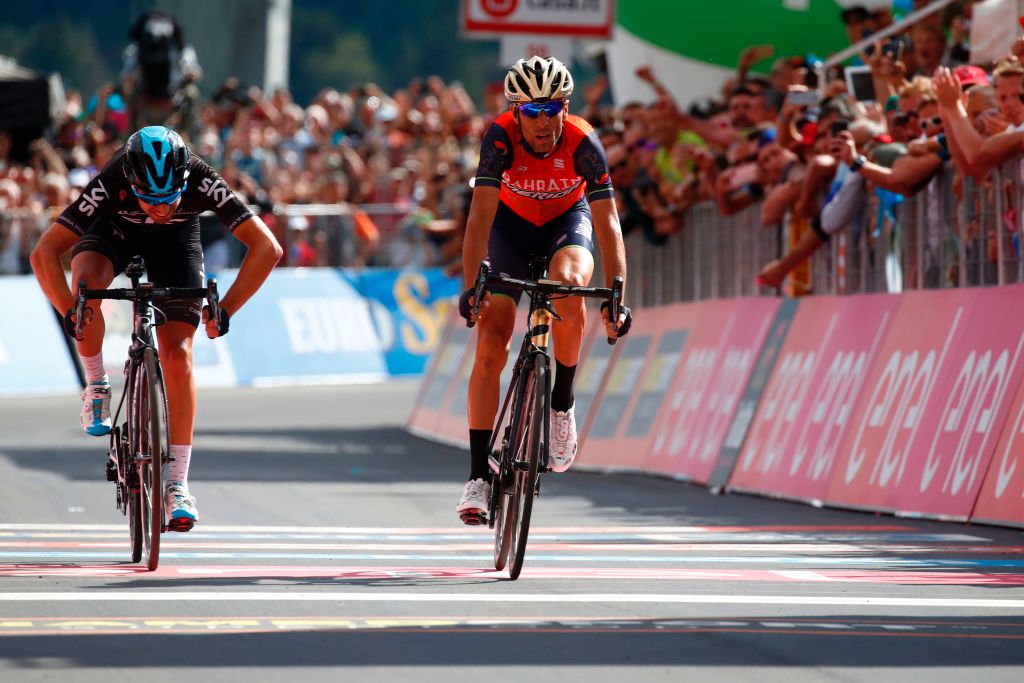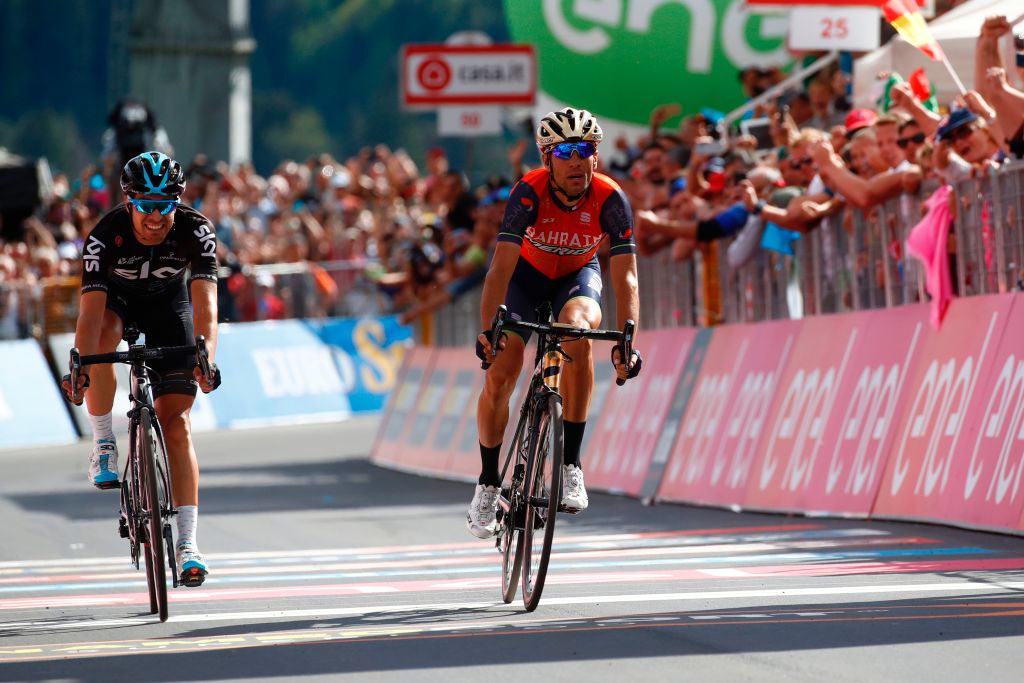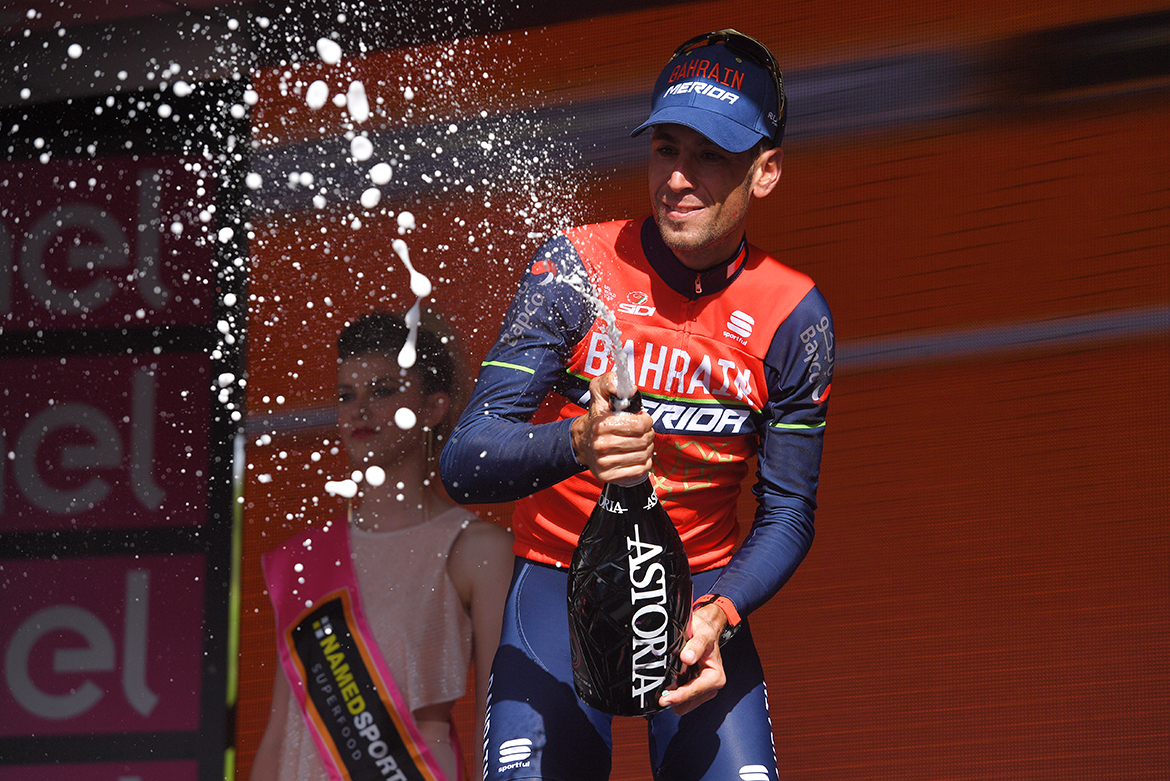Nibali: 'I never expect anybody to wait for me when I stop'
Sicilian claims stage win and moves up to third overall




Anything can happen in the final week of the Giro d'Italia, and Vincenzo Nibali (Bahrain-Merida) knows that better than anyone. The Sicilian out-sprinted Mikel Landa (Sky) to win stage 16 in Bormio after a white-knuckle descent of the Stelvio, moving up to third overall in the process, but the day will be remembered for the misfortune that befell race leader Tom Dumoulin (Sunweb) ahead of the final climb.
32 kilometres from the finish, as the group of favourites braced itself for a second assault on the Stelvio, this time by way of the Umbrailpass, Nibali's earpiece crackled to life with a surprising piece of news: the maglia rosa had stopped abruptly, disrobing with the haste of Reginald Perrin as he crouched on the roadside to answer a most urgent call of nature.
Nibali had begun the day 3:40 down on Dumoulin in the overall standings and viewed the Giro's tappone as a prime opportunity to begin reversing his losses of the previous two weeks. As Nibali, Nairo Quintana (Movistar) and the podium contenders began the climb, they had to decide whether or not to look this particular gift horse in the mouth.
At the beginning of Dumoulin's frantic chase, indecision reigned in the group containing Nibali et al, but with the Dutchman lagging a minute behind, and with the escapees – including danger man Steven Kruijswijk (LottoNL-Jumbo) – augmenting their advantage in front, the détente was not to be a lasting one.
"We were in the group two minutes down on the break, and we were going hard to begin the climb. Just before swinging left onto the Stelvio for the second time, the news came through that the maglia rosa had stopped. It wasn't clear what had happened," Nibali said. "The pace was high because Orica and Trek were pulling, but once we started the climb there was a moment when we stopped and slowed down. But the break's lead was growing, and a few riders started attacking again; the race was on.
"It was the finale of the stage and it was difficult to say if we should stop or not. It wasn't a crash but a problem that was maybe linked to a bad feed on the descent or not being properly covered up on his way down. In the history of cycling, there've been lots of incidents like this. I remember Peter Sagan having a similar problem at the Geelong Worlds and nobody stopped to wait for Peter Sagan."
The issue of temporary truces and the lack thereof has cropped up more than once on this Giro. Movistar showed little charity when Adam Yates (Orica-Scott), Geraint Thomas and Mikel Landa (Sky) were felled by a crash involving a police motorbike ahead of the Blockhaus. On Sunday, Dumoulin ordered a go slow when Quintana crashed on the descent of the Miragolo di San Salvatore. Suffice to say, Nibali has little patience for the debate over the correct etiquette.
The latest race content, interviews, features, reviews and expert buying guides, direct to your inbox!
"I'm very straightforward: I never expect anybody to wait for me when I stop. Many times, I've fallen or punctured and just set off again," Nibali said, adding with a pinch of sarcasm: "I don't know, maybe we could distort cycling and have a referee who stops the race in front and behind ... I don't know what to say. This is my opinion, even if many people might attack me for saying this."
Battling Quintana
On the Umbrailpass, Nibali was the man doing the attacking. Movistar had looked to prepare the ground for Quintana's expected onslaught by sending Winner Anacona and Andrey Amador up the road on the Mortirolo, but on the final ascent, it was Nibali who landed the first major blow. A stinging attack five kilometres from the summit split the group of favourites. A second, more sustained effort soon afterwards dislodged all bar Quintana, Domenico Pozzovivo (AG2R La Mondiale) and Ilnur Zakarin (Katusha-Alpecin). In the steep final kilometre, Nibali kicked again, and this time only Quintana could follow closely.
"I was the first to attack. It wasn't a very strong attack, but I went harder on the second attack. Nairo followed me and we got a gap. There were four or five kilometres to the summit from there, but there was this headwind, which forced us to form a sort of echelon sometimes on the climb. It wasn't easy," Nibali said. "I knew this side of the Stelvio and Joaquím Rodríguez told me about it. He said the hardest part was near the top and I made the last attack there."
Nibali's offensive was not yet complete. He managed to pull away from Quintana on the tortuous drop to Bormio, bridging across to Mikel Landa, the lone survivor of the early break. From there, Nibali seemed to switch into autopilot, instinctively calculating trajectories through sweeping bends and even bunny-hopping a wet stretch of road to keep his tyres dry. Landa just about held on for the ride, but the Basque climber was unable to deny Nibali in the sprint. "Paolo [Slongo] told me to take the last corner first, but it wasn't easy," Nibali said. "I managed to take it tightly and move past him."
Quintana came home 12 seconds later, having limited his losses well, but Nibali clawed back considerable ground on all of his other rivals. Thibaut Pinot (FDJ) conceded 1:35 and though stricken Dumoulin saved his maglia rosa, he lost 2:18 to Nibali. In the general classification, Nibali moves up to third overall, just 1:12 down on Dumoulin, and only 41 seconds behind Quintana.
"I suffered at Blockhaus and Oropa, where there was just one climb, and others were able to make the difference there," Nibali said. "This was a different stage to what we had up to now. It was very long, with lots of climbs, not just one."
In the space of 20 miles, Nibali's Giro has taken on a very different complexion.

Barry Ryan was Head of Features at Cyclingnews. He has covered professional cycling since 2010, reporting from the Tour de France, Giro d’Italia and events from Argentina to Japan. His writing has appeared in The Independent, Procycling and Cycling Plus. He is the author of The Ascent: Sean Kelly, Stephen Roche and the Rise of Irish Cycling’s Golden Generation, published by Gill Books.